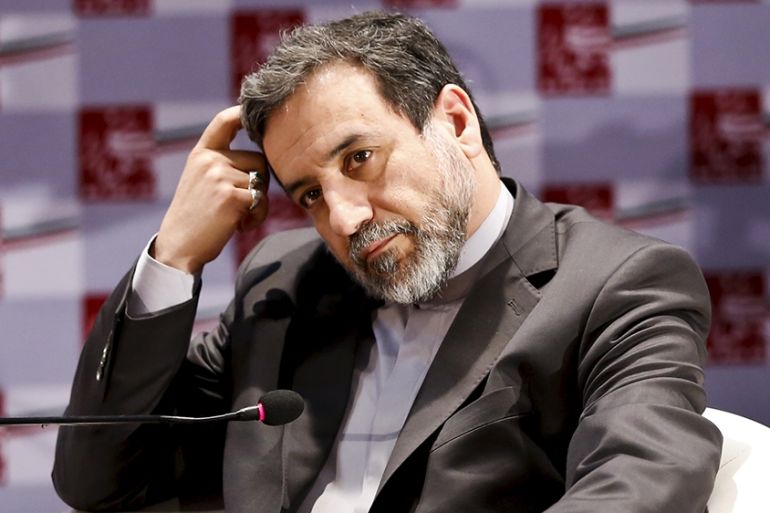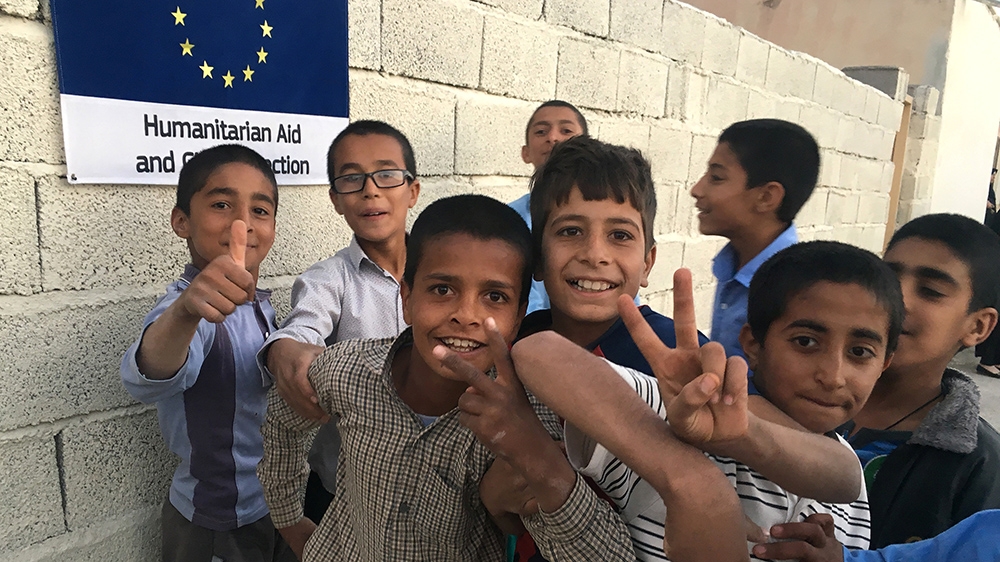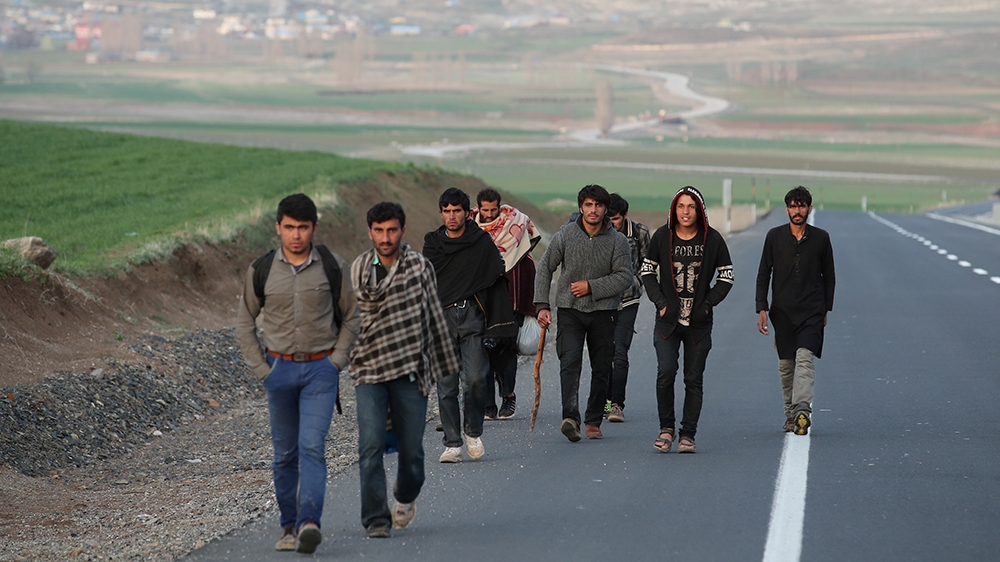Could US sanctions on Iran create new migrant crisis for Europe?
Critics question Iran’s claim that it can’t afford to keep hosting Afghan refugees. Iran says it’s a warning to Europe.

Tehran, Iran – Iranian foreign policy ignites its fair share of Twitter storms. But when a member of President Hassan Rouhani‘s administration said earlier this month that the country’s deepening economic crisis could lead to the expulsion of millions of Afghans from Iran, the criticism hit social media like a flash flood.
“Our country’s problems won’t be resolved with [the] departure of the dear Afghans,” tweeted conservative academic Mohammad Hosseini. “Perhaps they have even been more effective in bringing prosperity to the country than the government supported by you.”
Keep reading
list of 4 itemsBehind India’s Manipur conflict: A tale of drugs, armed groups and politics
China’s economy beats expectations, growing 5.3 percent in first quarter
Inside the pressures facing Quebec’s billion-dollar maple syrup industry
The editor-in-chief of the conservative news website FardaNews, Mohammad Saleh Meftah, was equally scathing. “Would that we would think about what our words do to three million of our Afghan brothers and sisters,” he tweeted. “Imagine you have become used to your life in Iran for years (perhaps generations) and a diplomat says he will displace you with a smile!”
The diplomat he referred to is Iran’s deputy foreign minister for political affairs, Abbas Araghchi. During a May 8 interview on state television, Araghchi warned that Iran may be forced to “ask our Afghan brothers and sisters to leave” if the economic crisis spawned by sanctions from the United States continues to squeeze the country.
He later said his comments had been misunderstood and called upon European leaders to welcome Afghans who might be forced to leave Iran – or help Tehran cope with the financial burden of hosting them by meeting pledges made to international organisations that support migrants.
European leaders are already dealing with large waves of refugees and migrants from the Middle East and Africa, and the anti-immigrant sentiment that has bubbled up as a result is altering the political fabric of many European nations.
By raising the spectre of millions of Afghan refugees adding to that burden, Araghchi illustrated how Iran’s economic hardships could become Europe‘s problem.
A squeeze on an already squeezed state
Iran is grappling with a painful economic crisis resulting from US President Donald Trump‘s decision last year to unilaterally withdraw from the Iran nuclear deal and reimpose sanctions that the White House officials have described as the “toughest ever placed” on Iran.
The country’s currency, the rial, has plunged in value. Jobs have been wiped out, the cost of living has soared, and the central bank is scrambling for foreign currency to pay for sanctions-exempt humanitarian goods such as food and medicine.
Against that deteriorating economic picture, Iran hosts an estimated three million documented and undocumented Afghans, including an estimated one million refugees that the United Nations High Commissioner for Refugees (UNHCR) describes as “one of the largest and most protracted urban refugee populations worldwide”.
Afghan refugees first started migrating to neighbouring Iran during the Soviet occupation of Afghanistan in the 1980s. Considering it a religious duty to protect Muslims, Iran’s late Supreme Leader, Ayatollah Ruhollah Khomeini, welcomed Afghans as religious migrants. “We are Muslims, they are also Muslims, [and] we must welcome and serve them,” he said.
Iran extends documentation to Afghan refugees and gives them permission to work in a range of occupations. The government also gives them a comprehensive range of state-funded services such as access to subsidised healthcare and education. In 2015, all Afghan children in Iran, regardless of status, were granted access to primary and secondary education – a move the UNHCR described as “groundbreaking”.

But those services cost money. And during his controversial interview with state television, Araghchi gave a detailed account of how much.
Afghan migrants currently hold more than two million jobs in Iran, said Araghchi. And those earning a living collectively send between three and five billion euros ($3.35bn-$5.58bn) abroad to their families each year – money that could help shore up Iran’s foundering if it was spent and invested in Iran.
The nearly half a million Afghan children attending public schools for free in Iran each cost the state 600 euros ($670) annually, while the 23,000 Afghans in Iranian universities each cost 15,000 euros ($16,743) a year.
“When American sanctions have an impact, and Iran’s financial resources are limited, and Iran’s oil exports turn zero – which will not happen – we are forced to implement special policies for the economy,” said Araghchi.
Leaving in droves
Not everyone believes Araghchi’s initial comments were anti-immigrant.
“I think he wanted to shine a light on vulnerable groups and let international decision-makers know that wholeheartedly supporting refugees is a must,” said Fatemeh Ashrafi, CEO of the non-profit HAMI – Association for Protection of Refugee Women and Children.
Ashrafi, who works with both documented and undocumented migrants and refugees, told Al Jazeera that the international community pitched in only $4m towards the primary education of refugees in Iran last year.
|
|
She added that US sanctions aren’t just harming Iranians, but the migrants and refugees that Iran is hosting.
“If we cannot afford to provide their expenses from public funds, then immigrants, especially Afghan workers in construction and industrial projects, will be the first to fall victim [to the faltering economy] because the priority will automatically move towards safeguarding the Iranian nationals first,” she said.
Most Afghans in Iran work in the country’s informal economy, and demand for their labour has plummeted along with the value of the rial.
This has contributed to an unprecedented 767,663 undocumented Afghans either leaving Iran voluntarily or being deported in 2018 – a 40 percent increase over the previous year, according to the International Organization for Migration (IOM).
The trend has continued in 2019. A further 175,491 Afghans have left Iran so far this year, according to the latest IOM report, which also projects that over half a million will have left by the end of the year.
#OpentheBorders
In the wake of Araghchi’s initial comments, some took to Twitter to question the motives of right-wing critics who accused the deputy foreign minister of fomenting anti-immigrant sentiment.
“There is no doubt that Abbas Araghchi’s use of words was wrong, but accusing him of racism is the height of political opportunism,” tweeted Iranian academic and pundit Sadegh Zibakalam.
Others immediately interpreted Araghchi’s comments as a tactic to pressure Europe to help Iran shoulder the burden of hosting millions of Afghans.

Adopting the Farsi hashtag #OpentheBorders, the Twittersphere implied that Iran should threaten to open its Western borders, which could allow millions of Afghans to enter Europe via Turkey.
“Mr Araghchi, you only need to open the country’s borders with Turkey and you can rest assured that all Afghans will go willingly,” tweeted Fariba Qolizade, a freelance journalist from Afghanistan.
In 2016, Iranian Interior Minister Abdolreza Rahmani Fazli said a state-commissioned survey had found that 60 percent or roughly 1.6 million Afghan immigrants in Iran wished to emigrate to Europe.
Meanwhile, others – including Afghanistan’s Ministry of Refugees and Repatriation – drew a hard line against using migrants and refugees as political pawns, and urged Iran not to politicise the status of vulnerable populations.